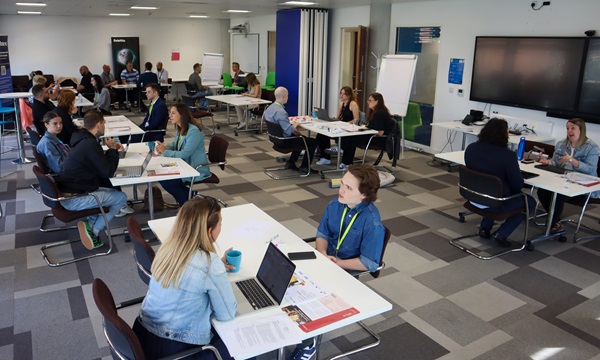As the leading voice for fintech in Wales, FinTech Wales is committed to empowering fintech organizations and professionals to succeed. At the heart of this mission is collaboration, which underpins all of FinTech Wales’ efforts to develop skills and talent, one of its four key strategic pillars, ensuring the future of fintech is secured through cooperative efforts between education, industry and government.
Wales has a vibrant fintech ecosystem, supported by leading colleges, universities and workplace training providers. These institutions play a crucial role in training the talent needed to drive growth in the sector. FinTech Wales acts as a facilitator, fostering critical collaborations between educators and employers, creating pathways for internships, graduate programs and apprenticeships that directly impact the talent pipeline.
Training providers make a significant contribution to FinTech Wales membership, such as Cardiff University, The Open UniversitySwansea University, SLA Training, Cardiff and Vale CollegeCode Institute as well as Future Finance.

Attract future talent
There has been a 10% increase in applications to computer science degrees in Wales, according to a 2023 study. Stats Wales report. This growth is part of a wider trend in the UK, driven by increasing demand for skills in emerging technologies such as AI and cybersecurity.
While this growing interest in technology-related skills is promising, early exposure to the fintech sector remains key to attracting top talent to the sector. Initiatives such as internship and mentoring programs can help by allowing students to tackle fintech issues before they graduate.
Some fintechs are taking a proactive approach to talent development by offering ongoing graduate programs and apprenticeship opportunities, which have a proven track record as part of their long-term strategies.
In 2023, de Novo Solutions, headquartered in Langstone, collaborated with the University of South Wales to launch an innovative degree apprenticeship programme.
“We believe that as we continue to grow and develop over the coming years – particularly in South Wales – it is important to contribute to the training and development of budding young technology professionals within the local community, who will not only gain valuable information about the technology sector. sector of our senior management team, but will also have the opportunity to make a real difference in building the Novo brand; while obtaining a valuable university degree,» said Mark Sweeny, founder and CEO of de Novo Solutions.
Connecting talent to employers
Outside of traditional educational pathways, coding academies and bootcamps are making significant strides in equipping individuals with the skills needed to transition into fintech roles. These programs provide hands-on, accelerated training, and we’ve seen promising results, with many graduates securing positions in the tech sector within weeks of earning their certification. However, challenges remain as not all graduates immediately find suitable employment opportunities.
FinTech Wales fills this gap through partnerships with training providers. Initiatives such as Quick Interview Day with Cardiff and Vale College and Recruitment Day with the University of South Wales provide a direct platform for talent to connect with employers. These events facilitate meaningful conversations, bridging the gap between qualified graduates and the companies eager to meet them.
Dan Hughes, Senior Practitioner Tutor at iungo Solutions, who completed the FinTech Wales Advance Data Academy in 2022, said: “Taking part in FinTech Wales Speed Interview Day was a fantastic experience. This allowed me to come into direct contact with employers as soon as the academy ended. The opportunity to showcase my skills in a supportive, fast-paced environment was invaluable.

Improve workforce skills
Skills development is another area where collaboration is vital. For fintech companies, prioritizing workforce upskilling in key areas is essential to remaining competitive and adapting to rapid technological change. AI presents both a challenge and an opportunity, requiring coordinated efforts between training providers, employers and government. A recent survey revealed that 56% of businesses in Wales are not confident in their knowledge of artificial intelligence (AI), which is lower than the national average in the UK, where 62% of employers think the same.
FinTech Wales has been at the forefront of organizing collaborative AI events in 2024 with its members including Ogi, Lewis Silkin, Menna and Peppercorn.ai, covering integration, regulation, ethics and fraud prevention. These events provide a platform for industry experts, educators and policy makers to share ideas and strategies, ensuring that upskilling initiatives remain relevant and aligned with business needs.
The future of fintech in Wales relies on sustained collaboration between all stakeholders: educators, employers and government agencies. FinTech Wales remains at the heart of these efforts, facilitating partnerships that support the development of a skilled and adaptable workforce. By prioritizing cooperation across sectors, FinTech Wales ensures that the talent pipeline continues to thrive, positioning Wales as a leader in fintech innovation for years to come.

